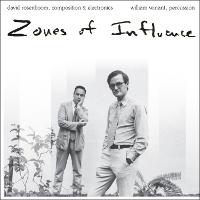|
David Rosenboom -
Zones of Influence

If
your head is not “influenced” by this marvelous sonic adventure, then
you’re beyond all hope, to be sure. David calls this music “a
propositional cosmology activated in music”…. hmmm…. wonder what that
means? As all of you know, my ears are totally jaded… I’ve
listened to many parts of the sonic range that others can’t lay claim
to…. & this one still threw me for a loop! Perfect evidence
of David’s penchant for blowing you mind can be found on the opener,
“The Winding of a Spring: The Stochastic Part“… if you’ve ever wondered
what a spring sounds like (no, not the one with water in it) – you’ll
“get it” when you scope out this one. Though the CD is
computer/electronic/percussion, it sounds more advanced &
full-bodied than much of such music being produced today. I
especially enjoyed the roaming nature of “Given the Senses the Real
Pregeometry“… in fact, it’s my favorite on the CD… rhythm changes that
will lead you (either) to madness, or complete synch with the
universe. Decidedly not “jazz”, this experimental gem still
merits my MOST HIGHLY RECOMMENDED for listeners who like to live “on
the edge”. “EQ” (energy quotient) rating is 4.97. Get more
information at the POGUS label page for this release. -Dick Metcalf,
Rotcod Zzaj
David Rosenboom’s Zones of Influence, composed in 1984-1985, is
a five-part work for solo percussion and computer generated
compositional algorithms. The composition, which is significant for the
innovative way in which it connected acoustic instruments with
real-time processing, was written for percussionist William Winant, who
performs it here.
Although the work was written as a solo for Winant, in a sense it
serves as a feature for a second performer as well. This “performer” is
the Touché computer assisted digital instrument, a keyboard designed by
Rosenboom and Donald Buchla at a time when MIDI technology being
developed but had not yet come into wide use. With Touché, Rosenboom
was able to combine Winant’s varied array of pitched and unpitched
percussion instruments with live processing in a way that was
groundbreaking at the time and still is provocative today. Happily,
Pogus has issued the complete work, the first time ever on a recording.
Touché’s role in shaping the overall texture of the work is immediately
apparent in the way it supplements the instruments’ timbral qualities.
Like many processing interfaces, Touché creates novel timbres, some of
which conserve something of the acoustic instruments’ sound
characteristics and some of which appear quite alien. Overall there is
a tendency toward timbres of a sleek-surfaced, metallic cast—sometimes
sounding as if they were produced by a hypertrophied toy piano–which
contrast markedly with the sounds of Winant’s wood and membrane
instruments. Particularly dramatic examples of this contrast can be
found in Winding of a Spring Tripartite Structure for three snare
drums, and Closed Attracting Trajectories Melody Set 2, for marimba and
xylophone.
Beyond the surface stratum of sounds, the electronics’ interventions
alter Winant’s performances at the compositional level. Rosenboom takes
patterns of tones or sounds produced by the performer and processes
them with real time compositional algorithms. A good example of this is
in Zones’ final section, where a set of arpeggios and glissandi on
violin—played by Rosenboom, as it happens—is subjected to accelerating
changes. By using recombinatory operations the program alters the
violin’s pitches, phrasing and tempos, sometimes quite dramatically.
The traditional value of thematic development is abstracted and
augmented by a multiplication of contrapuntal lines, leading to a
densely complex surface sound. Extended to the work as a whole,
Rosenboom’s compositional processing makes for an especially dynamic
structure built up of proliferating and interpenetrating lines.
Also included in this two-disc set is Study for Zones, a kind of
prototype work in which Rosenboom experimented with early versions of
the algorithms that would go into the making of the final work. - Dan
Barbiero, Avant Music News
|



